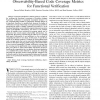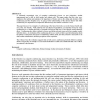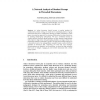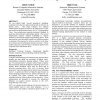270 search results - page 23 / 54 » Effective peer assessment for learning computer programming |
DAC
1998
ACM
13 years 12 months ago
1998
ACM
—Functional simulation is still the primary workhorse for verifying the functional correctness of hardware designs. Functional verification is necessarily incomplete because it i...
ETS
2000
IEEE
13 years 7 months ago
2000
IEEE
A commonly encountered view of computer conferencing focuses on peer interaction, student empowerment and a shift in both teacher and student roles. This paper argues that this vi...
ITS
2010
Springer
14 years 15 days ago
2010
Springer
As online discussion boards become a popular medium for collaborative problem solving, we would like to understand patterns of group interactions that lead to collaborative learnin...
SIGCSE
2004
ACM
14 years 1 months ago
2004
ACM
Introductory computer science students rely on a trial and error approach to fixing errors and debugging for too long. Moving to a reflection in action strategy can help students ...
CHI
2000
ACM
14 years 3 days ago
2000
ACM
We can reliably build “second generation” intelligent computer tutors that are approximately half as effective as human tutors. This paper evaluates two interface enhancements...




